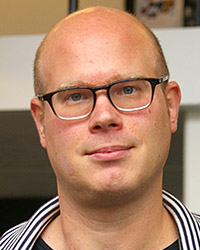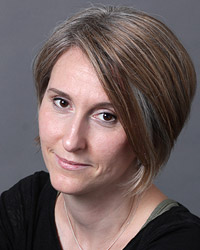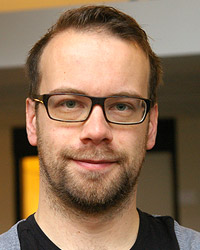
Introducing: Project Group The Scholarly Self
In November 2013, three PhD students started in Herman Paul’s VIDI project ‘The Scholarly Self: Character, Habit, and Virtue in the Humanities, 1860-1930’. In this newsletter they introduce themselves.
Introducing: Christiaan Engberts
 Though I was born in Amsterdam, I spent most of my youth in Leiden. As a young student, however, my first step was to move back to Amsterdam to study anthropology at VU University. During the year I spent there I discovered that the obligatory introductory philosophy course excited my interest more than most other courses. Therefore, the next year I went back to good old Leiden to study philosophy.
Though I was born in Amsterdam, I spent most of my youth in Leiden. As a young student, however, my first step was to move back to Amsterdam to study anthropology at VU University. During the year I spent there I discovered that the obligatory introductory philosophy course excited my interest more than most other courses. Therefore, the next year I went back to good old Leiden to study philosophy.
During this study I found out that my interest in the social sciences had not completely disappeared: within the program I was most attracted to those courses that taught me something about the way people organize their social and political lives. My master’s thesis dealt with the tension between ideas of national identity and global responsibility.
After interpreting the world in this rather abstract way it was time for a change. I decided to try to familiarize myself with a somewhat more down to earth field of study. In other words: I started a master’s in history. After all, the specialization ‘Political Culture and National Identities’ that Leiden offered seemed to be a logical intellectual follow up to my philosophy thesis.
Along the way I changed my plans a couple of times. First, I switched from the master’s program to the research master’s program. Next I decided to follow another specialization track. In 2012 I graduated in the field of ‘Migration and Global Interdependence’ with a thesis on the associational life of German migrants in early twentieth century Antwerp and Rotterdam.
Currently I am working on Herman Paul’s research project ‘The Scholarly Self: Character, Habit, and Virtue in the Humanities, 1860-1930’. My research within this project will focus on informal accountability practices. I will mainly be concerned with correspondences between scholars in the oriental studies.
Even voorstellen: Katharina Manteufel
 In my subproject "Scholarly Aptitude: Criteria for Selection and Promotion", I am focusing on the socialization of scholars in the making, meaning the processes regarding negotiating and appropriating ideals in tangible, personified practices. Before I started in Leiden, I studied history (BA) and cultural history (MA) in Utrecht. Originally from Germany, I have been living in the Netherlands for over a decade. As a part-time student, I was combining my studies with a daytime job at a school for children with special needs. Defining my research interests, I came to concentrate on the history of "madness" and social care policies. My MA thesis was a case study of early modern Dordrecht, regarding the position of the insane in the local culture of institutional charity.
In my subproject "Scholarly Aptitude: Criteria for Selection and Promotion", I am focusing on the socialization of scholars in the making, meaning the processes regarding negotiating and appropriating ideals in tangible, personified practices. Before I started in Leiden, I studied history (BA) and cultural history (MA) in Utrecht. Originally from Germany, I have been living in the Netherlands for over a decade. As a part-time student, I was combining my studies with a daytime job at a school for children with special needs. Defining my research interests, I came to concentrate on the history of "madness" and social care policies. My MA thesis was a case study of early modern Dordrecht, regarding the position of the insane in the local culture of institutional charity.
A long-standing interest in the history of the human sciences forms the connection between my undergraduate research and my new project. Switching from the field of the applied social sciences to the humanities, however, marks a personal turning point. My earlier choice of topics reflected concerns of my daytime occupation at the time, as well as my training as a pedagogue in disability and mental-health care in the 1990s. In the course of my studies, however, I found that it was the pursuit rather than the results of historical research, theorizing and reflecting, that enthralled me. Consequently, I started preparing for a PhD trajectory during the last stages of my study and when I learned about the position in Leiden, I did not have to think twice: it appeared to me as the perfect opportunity to engage with the history of the "scholarly persona" at the very moment I readied myself for the leap into professional scholarship as a historian.
Even voorstellen: Léjon Saarloos
 Born in Stad aan’t Haringvliet (a tiny village in South Holland) in 1988, I grew up amidst farms and small villages. After completing my HAVO at C.S.G. Prins Maurits in 2005, I followed in my brother’s footsteps and attended the PABO at Hogeschool Rotterdam, from which I graduated as a primary school teacher in 2009. However, during my studies in Rotterdam I grew more and more interested in general history and art history, so I decided to move to Utrecht and start my Bachelor’s programme of History at Utrecht University. This was probably my best decision up to this day. Although I kept working as a substitute teacher at primary schools in and around Utrecht, I increasingly came to enjoy the comforts and business of student life.
Born in Stad aan’t Haringvliet (a tiny village in South Holland) in 1988, I grew up amidst farms and small villages. After completing my HAVO at C.S.G. Prins Maurits in 2005, I followed in my brother’s footsteps and attended the PABO at Hogeschool Rotterdam, from which I graduated as a primary school teacher in 2009. However, during my studies in Rotterdam I grew more and more interested in general history and art history, so I decided to move to Utrecht and start my Bachelor’s programme of History at Utrecht University. This was probably my best decision up to this day. Although I kept working as a substitute teacher at primary schools in and around Utrecht, I increasingly came to enjoy the comforts and business of student life.
I went in headfirst and soon found friends among my fellow students, mostly members of the Utrechtse Historische Studentenkring. During my study, I engaged in all sorts of activities, varying from being an actor and director in a theatre group and the organization of the Nationale Studenten Geschiedenis Nederland Dag (National day of history students) to working as an editor and writer for Historisch Tijdschrift Aanzet and travelling a lot. However, my main concern has always been with my study. I specialized in cultural and intellectual history and graduated with a thesis on Descartes in the context of the Scientific Revolution. Due to financial problems I was forced to follow a one year Master’s programme, rather than a Research Master’s programme, which I preferred.
Luckily, Utrecht University offered a one year programme in Cultural History, a Master I found incredibly interesting and challenging. I was very motivated to get good results and specialized myself in the use of cultural concepts to make sense of historical situations. This interest culminated in my Master’s thesis on the Dutch Psychiatrist Gerbrandus Jelgersma, the construction of his expertise and the travelling of knowledge. My motivation and hard work were not in vain. I graduated cum laude in 2013. Moreover, I got the chance to teach a World History course to first year students, in which I could combine my two ‘passions’; history and education. During my Master’s, I decided it was time for the next step and started to look for PhD-positions.
Although I expected a long search, a few weeks after my graduation Herman Paul’s project ‘The Scholarly Self’ popped up, a project that fits my interests and skills as a cultural historian neatly. I am therefore very excited to be part of this project , in which I will focus on ideals of scholarly selfhood and how scholars around 1900 envisioned the disciplining of their bodies, hearts, and minds (based on lengthy scholarly obituaries from various European countries). I look forward to five wonderful years at Leiden University.
